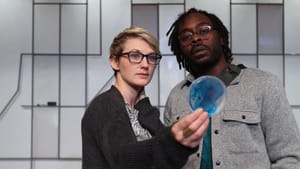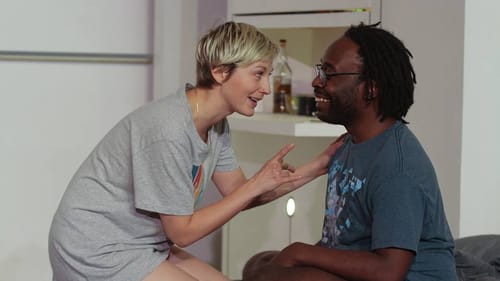Stay in the Loop
BSR publishes on a weekly schedule, with an email newsletter every Wednesday and Thursday morning. There’s no paywall, and subscribing is always free.
Program error
Theatre Exile presents Itamar Moses’s ‘Completeness’

In Completeness, a decade-old work revised for its Philadelphia premiere at Theatre Exile, playwright Itamar Moses can’t decide whether he wants to be Tom Stoppard or Nora Ephron. His characters — STEM grad students, equally brainy and sexy — only seem to stop kissing and canoodling long enough to discuss the finer points of yeast proteins or computational intractability. Sounds hot, right?
At one point, computer-science major Elliot (James Ijames) leaps energetically from bed post-coitus to explain the “traveling salesman problem,” his field of study’s theoretical white whale, to his new flame, molecular biologist Molly (Mary Tuomanen). Using a whiteboard conveniently embedded into the walls of his room — the lightbox set is by Colin McIlvaine, after a design by Darcy Scanlin, with moody lighting from Alyssandra Docherty — he breaks down the heuristic and how it relates to polynomial time, algorithms, and computational completeness. Since Molly doesn’t grab her clothes and run screaming into the night, I guess we’re supposed to find this intellectually and sensually stimulating.
Show your work
But like so much in this undercooked one-act, directed with a rather heavy hand by Matt Pfeiffer, the scene drips with an off-putting sense of performative cleverness. Unlike the best works of Stoppard, which can make complex theories feel as vibrant and unforced as everyday conversation, Moses seems overly intent on showing the audience his research acumen. Like an overeager student, he crams a textbook’s worth of arcana into the play’s 90 minutes, without a sense of cohesion or even full understanding of the subject matter.
And unlike the best works in the romantic-comedy genre, the relationship between Elliot and Molly — to say nothing of their various other suitors, all played with a general lack of specificity by Claire Inie-Richards and Justin Rose — lacks effervescence and pathos. They meet cute (in their university’s computer lab, natch), screw cute, fight cute, dump cute, and reconcile cute. But Moses never gives us a sense of what motivates their complicated attraction to each other.

All you’re going to learn
Instead, he defines them through glib dialogue that sounds less flirty than cringe-inducing. (Molly to Elliot: “Having sex without first examining the genitals is like biting into a piece of fruit without looking at it.” Geez.) Ijames and Tuomanen are both interesting, charming performers; they throw themselves into their roles, displaying comfort with the script’s scientific jargon and a desire to broaden their essentially flat characters. But even the most talented actors can only do so much when playing roles crafted with little distinction.
Near the play’s end, as it becomes clear that we know all we’re ever going to about Elliot and Molly, Moses inserts a metatheatrical red herring that stops the show in more ways than one. I won’t reveal what he does, except to say that it’s meant to disorient the audience and seem daring. In reality, it merely tries our patience, and suggests a playwright who’s written himself into a dramaturgical corner and sees no other way out.
Completeness contains the elements that could be used to make a better play, a rom-com with rigor and sharp teeth. But like the algorithm Elliot unsuccessfully builds to impress Molly, it also includes too many fatal errors.
What, When, Where
Completeness. By Itamar Moses, Matt Pfeiffer directed. Theatre Exile. Through December 23, 2018, at the Louis Bluver Theatre at the Drake, 302 S. Hicks Street, Philadelphia. (215) 218-4022 or theatreexile.org.
Sign up for our newsletter
All of the week's new articles, all in one place. Sign up for the free weekly BSR newsletters, and don't miss a conversation.

 Cameron Kelsall
Cameron Kelsall